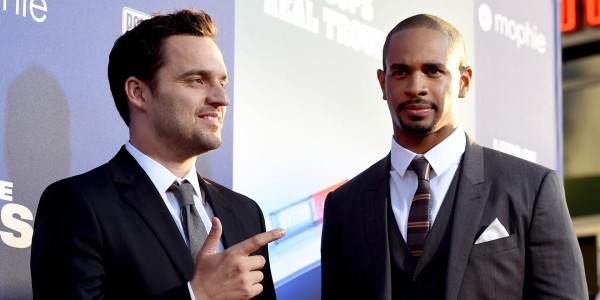Two days after being lavished with Emmy nominations for “Desperate Housewives,” series creator Marc Cherry appeared before an especially appreciative gathering: Outfest 2005, a gay and lesbian film festival.
The ABC satire on suburbia that emerged as the runaway hit of the past TV season has a solid homosexual pedigree, even if the show’s gay sensibility is more sly than overt: Cherry is gay and so are several of his writers.
At Outfest, he and the program were celebrated with a panel discussion, billed as “Queer is Just a Frame of Mind on Wisteria Lane,” that included star Marcia Cross and members of the writing and producing staff.
That “Desperate Housewives” carries what one audience member called “a gay vibe” wasn’t the goal, Cherry said, but he conceded the show inevitably reflects his personality.
“The moment you put a woman in an evening gown mowing the lawn, it’s just gay,” said Cherry, referring to a slapstick scene with actress Eva Longoria. “It’s kind of just what makes me laugh. A lot of my gay brethren get the joke.”
But fans hoping to hear Cherry and his staff revel in the power of producing a hit reaching 24 million viewers might have come away disappointed. Yes, a teenage boy tried an experimental kiss with another boy and, yes, a lesbian likely will come into the mix sometime, Cherry said.
Goal is to entertainHowever, the real mission for “Desperate Housewives,” set on tidy but dysfunctional Wisteria Lane, is uncomplicated, said Cherry, who wrote for sitcoms “The Golden Girls” and “The Five Mrs. Buchanans.”
“My obligation, first and foremost, is to entertain,” Cherry told The Associated Press. “If the stories I do have some kind of emotional resonance for the viewers or perhaps some social significance, that’s great. But I don’t start with that. I don’t start with an agenda.”
It’s a position echoed by the creators of a more explicitly gay-themed show, the long-running NBC comedy “Will & Grace,” which like “Desperate Housewives” pulled in 15 Emmy nominations last week to top all other series. Both will vie for best comedy at the Sept. 18 awards.
Slideshow 26 photos
Celebrity Sightings
“He stole our line,” “Will & Grace” executive producer Max Mutchnick said jokingly of Cherry’s assertion that his show is designed to amuse, not lecture.
“We never set out to change minds and attitudes,” fellow “Will & Grace” creator and executive producer David Kohan told the AP. “We set out to make a romantic comedy with an insurmountable obstacle. I think you set out to write about themes and ideas or to express a political point and your characters die on the page.”
There’s nothing new about gays as a creative force in Hollywood. But for the Outfest crowd Cherry’s control of a vast TV forum was obviously heady.
One man told Cherry he may be the “most powerful influence we have to talk about gay issues” on-screen (“Oh, that’s frightening,” Cherry quipped in response).
Another asked the panelists if they felt they were pulling off “the biggest joke on America ... and they’re just eating it up,” drawing a demurral from consulting producer Katie Ford.
“I don’t think we feel like we’re pulling anything over on anybody,” Ford said. “There’s a level of compassion for all the characters. ... Rather than pulling something over, I think it’s that we’re including everybody. That’s kind of the key to its success, that it’s universal.”
But not universally, or at least unconditionally, acclaimed.
Josh Aterovis, a novelist (“Reap the Whirlwind”) and columnist who is gay, said he welcomes Cherry’s success as a sign that gays “don’t have to stay in the closet” to make good.
But his enjoyment of the series is tempered by reservations about its depiction of gays, he said.
“Almost all of the portrayals of gay people are on the negative side,” Aterovis said. Among the examples he cites: the teenager who is exploring homosexuality also killed a woman in a hit-and-run accident and expressed no remorse.
Ed Vitagliano, spokesman for the American Family Association, a conservative Christian group, said he recognizes “Desperate Housewives” to be well-crafted but criticized it for what he called its pervasive and misguided sexuality.
“The problem we have with programs that exploit sexuality of any variety — bisexual, heterosexual, homosexual, is simply that they are substituting sex for legitimate relationships,” he told the AP. “We would have a problem with homosexuality as well as adultery. These are all signs of human brokenness.”
Even producers who claim entertainment as their only goal, he said, cannot avoid implicitly portraying their view of the world. But in an article for the association, Vitagliano conceded there is a “form of morality” in the series, such as the negative light in which sexually active divorcee Edie (Nicollette Sheridan) is cast.
During Outfest, Cherry himself pointed with apparent pride to the show’s moral code. When single mom Susan (Teri Hatcher) confronts Gabrielle (Longoria) over an affair, “it wasn’t, ‘I understand,”’ he said. “It was, ‘What the hell are you doing cheating on your husband?’
“There’s a lot of soap operas that never have someone take the high moral ground, go, ‘This is wrong, this is adultery,”’ he said.
Even if shows like “Will & Grace” and “Desperate Housewives” claim to studiously avoid the soapbox, their viewers may be sending their own message about attitudes toward gay Americans, Mutchnick said.
“If people were so petrified or repulsed by this subject matter or this style or this sensibility, we wouldn’t see the (audience) numbers we see on these shows,” he said.
Kohan agreed with his producing partner, to a point.
Accepting gays or any minority as entertainers “might be the biggest and easiest hurdle to get over,” he said. “It’s like maybe the first step is saying, ‘Hey, they make good minstrels. Maybe they’re not such bad people after all.’
“And then change comes gradually,” Kohan said.
